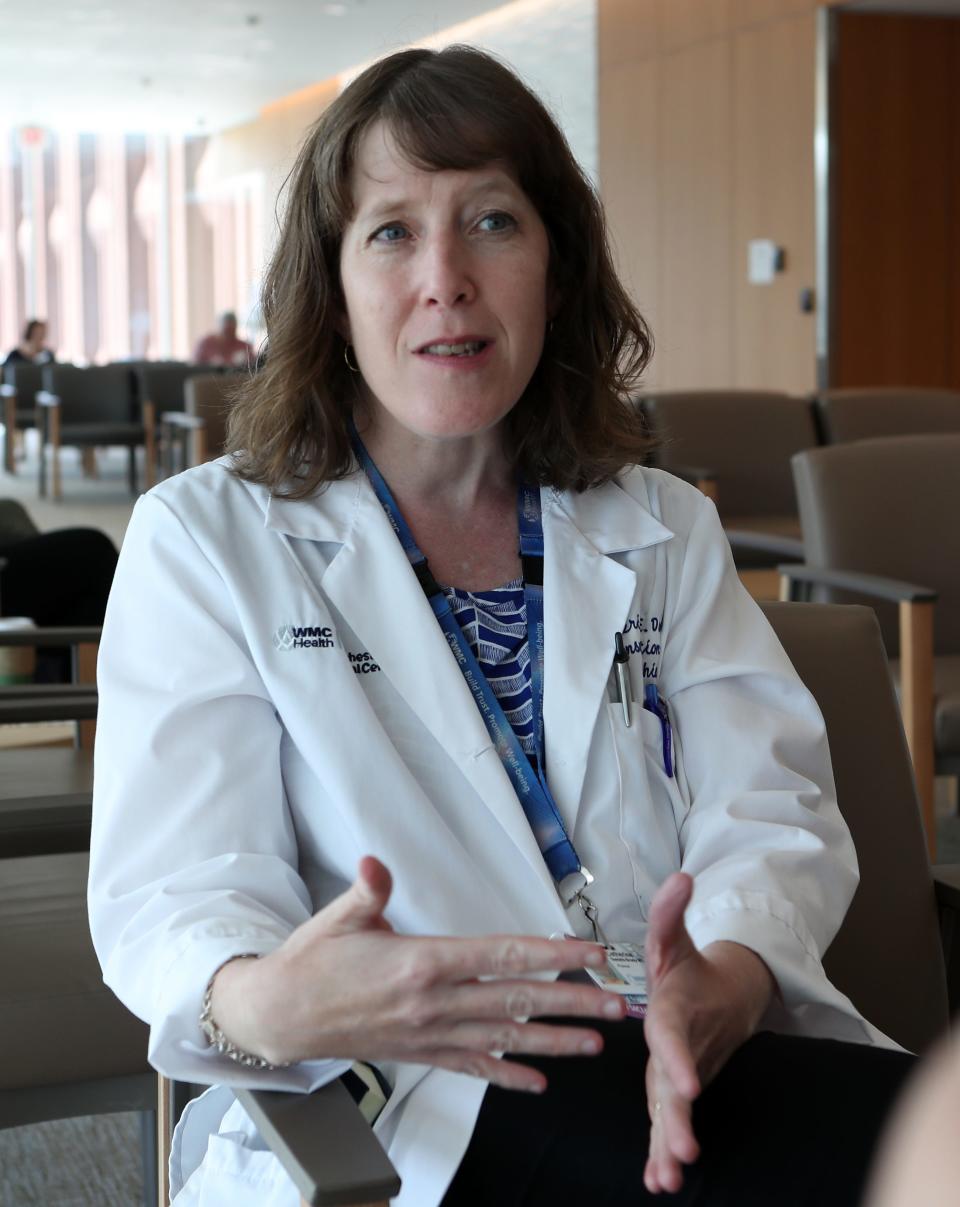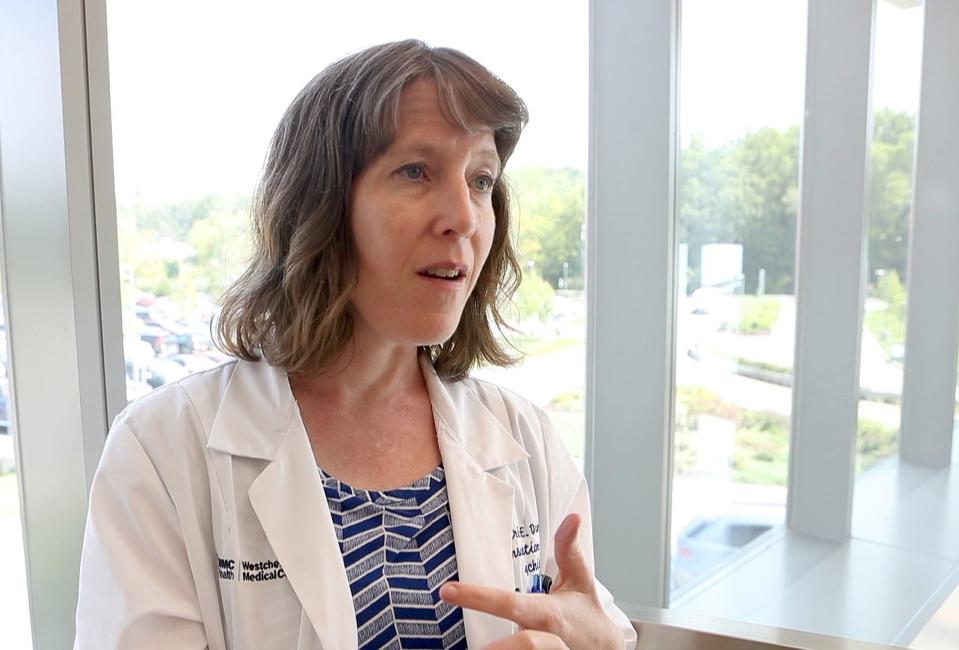Postpartum depression: After doctor's murder-suicide, a look at prevalence, treatment
One in seven women develop postpartum depression in the U.S. after giving birth, according to the National Institutes of Health.
It's the most common medical complication post-pregnancy in the country, said Dr. Catherine Daniels, a psychiatrist at Westchester Medical Center who specializes in women's health. And it is treatable.
But in very rare instances, it can be deadly.
Tragedy in Somers
On the morning of Aug. 5, a Saturday, Dr. Krystal Cascetta of Somers fatally shot her baby, then herself.
Cascetta was site chief of the Mount Sinai Queens Infusion Center, a treatment center for cancer and blood disorders, and was an assistant professor of hematology and oncology at Mount Sinai's Icahn School of Medicine.
Infanticide-suicide: Prominent oncologist kills baby and herself at their Somers home, police say
She and her husband, Timothy Talty, had a baby around March. He was not at their Granite Springs Road home when the tragedy occurred.
It is not known whether Cascetta had been diagnosed with or treated for any postpartum disorders.
With a vacuum of information and the backdrop of an event too horrific to imagine, many are now focused on postpartum depression and postpartum psychosis, a much more rare mental health crisis that isn't always linked to PPD.
What is postpartum depression

Postpartum depression is a health disorder that lingers beyond two-week post-birth “baby blues.” Strong feelings of sadness, anxiety, fatigue can make it difficult to take care of oneself and baby; it can cause shame, feelings of worthlessness, thoughts of self harm and harm to the infant.
In postpartum psychosis, Daniels said, a person "just loses touch with reality, has a delusional interpretation of events."
Daniels points out that postpartum women have a lower rate of suicide than women in general.
But a shocking event like the Somers tragedy draws attention. That can offer opportunities to prevent more tragedies by educating the public about postpartum mental health issues. But it can also create further stigma and barriers to treatment.
Who is at risk
The conventional predictors for depression and other mental health crises apply to postpartum depression too: a person under stress from economic and interpersonal challenges, little familial or social support, a history of mental health issues in the family. Developing depression during a pregnancy also is seen as a risk factor for PPD.
But, Daniels said, she's seen people who are high risk who do fine, and those with every possible support and no history of mental health struggles get struck with serious postpartum depression.
"It really doesn't discriminate," Daniels said.
Emotional, physical changes
A new baby is a huge adjustment. People anticipate and plan. But, Daniels said, adding a little person who needs help with every aspect of life creates "changes in relationships that can't truly be anticipated."
Someone's own anticipations and expectations can cause further stress. "If we or the system around us is too fixated on preconceived notions," Daniels said during an interview at WMC in Valhalla, that creates stress on top of the exhaustion and strains of new parenthood.

Meanwhile, the process of birth causes huge hormonal and chemical changes. Those hormones shifts can cause changes in brain chemistry and signaling, Daniels said.
"Even in 2023, the exact understanding of depression haven't been completely ironed out," said Daniels. Nor is it clear why some women are more susceptible to hormonal changes during their reproductive lives.
Treatment available
Daniels said that it is now standard to discuss postpartum depression with families during birth classes, at the obstetrician, at baby's first pediatrician appointments.
But medical providers can't be sure people really listen.
"You're telling them information and nobody ever thinks it's going to be them," Daniels said. "People don't think it's going to be their loved ones."
If PPD does manifest, part of any depression often includes a reticence to admit the need for help.
"All the negativity and sadness can just bounce around like an echo chamber," Daniels said. But, "when you start opening yourself up, especially to supportive, understanding people, it lessens the echo."
Daniels said people may not realize that talk therapy helps and effective medications are available that are "absolutely safe" during breastfeeding.
Treatment breakthrough: First-ever postpartum depression pill, Zurzuvae, approved by FDA
For example, the FDA announced last week that it had approved a medication called Zurzuvae that is the first pill-form medication aimed at treating PPD. Other medications and another postpartum depression medication given as an infusion also can help.
The first step, Daniels said, is seeking support. "Starting to open up will help more than you realize."
Get help
The Postpartum Resource Center of New York, postpartumny.org, offers support to all people after a birth. The nonprofit is open 9 a.m. to 5 p.m. seven days a week, and calls are returned that day.
Call: 855-631-0001 or 631-422-2255; email info@postpartumny.org.
PPRNY also offers a resource directory to find support and services; go to postpartumny.org/resourcedirectory.
The organization makes clear that it operates a helpline, not a hotline.
For immediate help:
Medical assistance: Dial 911.
Suicide & Crisis Lifeline: Dial 988 or https://988lifeline.org/
New York State Domestic Violence Hotline: Dial 1-800-942-6906
Crisis Text Line: Text "Got5" to 741-741
Frontline worker: Text “FRONTLINENY” to 741-741 for specialized support
Nancy Cutler covers People & Policy for lohud.com and the USA Today Network New York. Reach her at ncutler@lohud.com; follow her on Twitter, Threads and Instagram at @nancyrockland.
This article originally appeared on Rockland/Westchester Journal News: Postpartum depression in spotlight after NY mom kills baby, self

